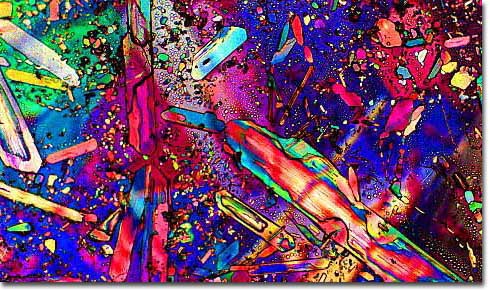|
Somatrem and
somatropin
are trade names for synthetic versions of
HUMAN GROWTH HORMONE (Protropin®)
that are made by bacteria using recombinant DNA
technnology. In March of 1979, D.V. Goeddel, et al of
Genentech, announced they had an expression vector (a bacterial cell
containing a cDNA plasmid) in E.coli for
HGH (Nature 281:544-548, 1979). The
HGH made this way is today sold as
Protropin®. Genentech received FDA
approval for
Protropin® in October 1985 for the long-term
treatment of children who have growth failure due to a lack of adequate
endogenous growth hormone secretion. It was Genentech's first commercial
product.
Protropin® (somatrem
for injection), is a peptide hormone that has 192 amino acid residues and a
MW of about 22,000 daltons. The product contains the identical sequence of
191 amino acids constituting pituitary-derived human growth hormone plus an
additional amino acid, methionine, on the N-terminus of the molecule. Protropin®
is synthesized in a special laboratory strain of E. coli bacteria, which has
been modified by the addition of the gene for human growth hormone
production.
Protropin®, given for growth hormone
deficiency,
GHD,
a pituitary disorder resulting in shortness.
GHD occurs when the
production of growth hormone, secreted by the,
pituitary gland, is disrupted. Protropin®
stimulates skeletal growth in those patients that have a growth hormone
deficiency. It is also used for long term treatment of children who have
growth failure due to a lack of adequate endogenous growth hormone
secretion. An unusual side effect includes leukemia, although it has not
been firmly established that the blood disease originated from treatment
with human growth hormone. |
ETHICAL
SIDENOTES:
1. A vast Anti-Aging industry
exists
around synthetic HGH & it is a
USADA banned
substances in international
athletics (IOC,
NCAA, FIFA, etc).
2.
Initial experiments done with a
cDNA piece
taken by Peter Seeburg, a post-doctoral student
at UCSF in the 1970's, who went on to
Genentech with "purloined pieces of
cDNA", may have lead to the first synthetic gene product and a viable
industry of genetic engineering we see today. UCSF sued for patent infringement and won.
Genentech settled for $200,000,000 in November of 1999. |
 |
